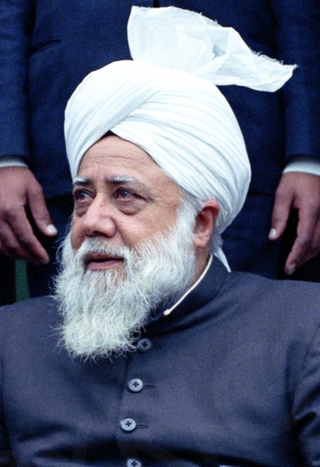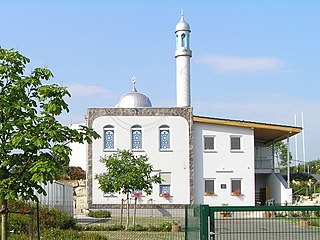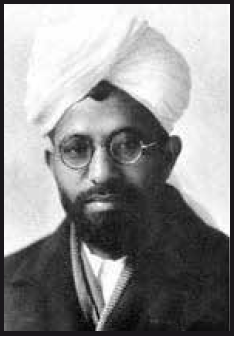Rabwah, officially known as Chenab Nagar, is a city in Chiniot, Punjab, Pakistan on the bank of Chenab River. It was the headquarters of the Ahmadiyya Muslim Community from September 20, 1948 when the community relocated from Qadian, India to the newly created state of Pakistan, where the community bought the area of present-day Rabwah from the government to establish its home. This continued until 1984 and the establishment of Ordinance XX. In 1984, the headquarters were moved to the United Kingdom with Mirza Tahir Ahmed, first to London and then in 2019 to the Islamabad compound in Tilford, Surrey.

The Baitul Futuh is a mosque complex of the Ahmadiyya Muslim Community, situated in Morden, London. It is one of the largest mosque complexes in Europe. Completed in 2003 at a cost of £15 million, entirely from donations of Ahmadi Muslims, the Mosque can accommodate a total of 13,000 worshippers. The main mosque has a height of 23m above ground, and to maximise capacity the building extends below ground. Baitul Futuh is located in the south-west London suburb London Borough of Merton. It is situated next to Morden South railway station, 0.4 miles from Morden Underground station and one mile from Morden Road tram stop.

Mirza Tahir Ahmad was the fourth caliph and the head of the worldwide Ahmadiyya Muslim Community. He was elected as the fourth successor of the founder of the community, Mirza Ghulam Ahmad. He was elected on 10 June 1982, the day after the death of his predecessor, Mirza Nasir Ahmad.

Mirza Nasir Ahmad was the third Caliph of the Ahmadiyya Muslim Community from Pakistan. He was elected as the third successor of Mirza Ghulam Ahmad on 8 November 1965, the day after the death of his predecessor and father, Mirza Basheer-ud-Din Mahmood Ahmad.

Mirza Basheer-ud-Din Mahmood Ahmad was the second caliph, leader of the worldwide Ahmadiyya Muslim Community and the eldest son of Mirza Ghulam Ahmad from his second wife, Nusrat Jahan Begum. He was elected as the second successor of Mirza Ghulam Ahmad on 14 March 1914 at the age of 25, the day after the death of his predecessor Hakim Nur-ud-Din.

Hakeem Noor-ud-Din was a close companion of Mirza Ghulam Ahmad, the founder of the Ahmadiyya Movement, and his first successor and first Ahmadiyya caliph since 27 May 1908.

The Fazl Mosque also known as The London Mosque, is the first purpose-built mosque in London, England. It was opened on 23 October 1926 in Southfields, Wandsworth. At a cost of £6,223, the construction of the mosque and the purchase of the land on which it stands, was financed by the donations of Ahmadi Muslim women in Qadian, Punjab, British India, with support from the British Muslim convert Khalid Sheldrake. Between 1984 and 2019 the Fazl Mosque was the residence of the caliphs of the Ahmadiyya Muslim Community, and therefore its de facto international headquarters. The administrative headquarters now lies at the site of the Islamabad, Tilford.

Mirza Masroor Ahmad is the current and fifth leader of the Ahmadiyya Muslim Community. His official title within the movement is Fifth Caliph of the Messiah. He was elected on 22 April 2003, three days after the death of his predecessor Mirza Tahir Ahmad.

Baitul Islam is a mosque in Vaughan, Ontario run by the Ahmadiyya Muslim Community (AMJ) in Canada. It was inaugurated on October 17, 1992 in the presence of the fourth Caliph of the community and many Members of Parliament.

The Baitul Huda in Usingen is a mosque in Germany run by the Ahmadiyya Muslim Community (AMJ) and was inaugurated on September 7, 2004, by Mirza Masroor Ahmad.

Jalsa Salana is a formal, annual gathering of the Ahmadiyya Muslim Community. It was initiated in 1891 by Mirza Ghulam Ahmad, the founder of the community, in Qadian, India. Usually, the gathering spans three days, beginning with the flag hoisting ceremony following the Friday Sermon. Although the convention held in the UK is deemed to be the major and 'international Jalsa' attended by Ahmadis from across the world, Ahmadis in other countries hold their own national Jalsas, sometimes attended by the Khalifatul Masih.

Majlis Khuddam-ul-Ahmadiyya is one of five auxiliary organizations in the Ahmadiyya Muslim community. It is the young men's branch of the community, particularly for those between the ages of 15 and 40. In some English-speaking countries it is also known as the Ahmadiyya Muslim Youth Association (AMYA).

Jāmi’ah al-Ahmadīyyah is an International Islamic seminary and educational institute with campuses in Pakistan, United Kingdom, India, Ghana, Canada, Germany, Nigeria, Indonesia, Bangladesh, Malaysia, Tanzania, Sri Lanka, Sierra Leone, and Kenya. In addition, there are affiliated Mu'alameen centers in Pakistan and Madagascar. Founded in 1906 as a Section in Madrassa Talim ul Islam by Mirza Ghulam Ahmad of Qadian, the founder of the Ahmadiyya Muslim Community, it is the main centre of the Ahmadiyya Muslim Community for Islamic learning.

The Ahmadiyya Muslim Community was established in United Kingdom was established in July 1913 as one of the oldest Islamic associations in the UK. The community has built its presence with the establishment of significant sites such as The London Mosque in 1926. Over the decades the community has grown and become known for its annual convention the Jalsa Salana, interfaith dialogues and humanitarian efforts. The UK has also served as the headquarters of the community since 1984 currently in Islamabad, Tilford, in Surrey.
In the period spanning from late May to early September 1974, an altercation between students of Islami Jamiat-e-Talaba and youths of the Ahmadiyya Muslims Community at the Rabwah railway station. This incidents were marked by a series of events such as protests, violence, property damage, and governmental actions against the Ahmadiyya community across Pakistan. These events reportedly resulted in casualties among Ahmadi individuals and damage to Ahmadi mosques. Furthermore, in response to these events, the government took actions, including constitutional amendments, related to the status of Ahmadis.

Abdur Rahim Dard, known as A. R. Dard was an Ahmadi Muslim writer, missionary, and political activist for the Pakistan Movement, who served as the Imam of the historic Fazl Mosque, the premier gathering place for Indian Muslims regardless of denomination in London. He is known for convincing Muhammad Ali Jinnah to return to British India and fight for the Pakistan Movement.

The Bejtul-Evel Mosque commonly known as Baitul Awal Mosque is Ahmadiyya Mosque in Tirana, Central Albania, Albania.

Ahmadiyya is an Islamic movement in Australia, first formally founded in the country in the 1980s, during the era of the fourth caliph. However, the history of the Community dates back to the early 20th century, during the lifetime of the founder of the movement, Mirza Ghulam Ahmad, with the first contacts arising as a consequence of Australians travelling to British India, and also as a consequence of early, "Afghan" camel drivers settling in Australia during the mid to late 19th century. Today there are at least four Ahmadi mosques in four of the six Australian states, representing an estimated 6,000-8,000 Australian Ahmadis in the country.

Al Hakam is an English-language, Islamic newspaper, published weekly by the Ahmadiyya Muslim Jama'at.

















